It’s clear a visit to Singapore’s Raffles Hotel is going to be special when your car pulls into the circular driveway. The crunch of gravel gives the place an air of Downton Abbey, but the hotel’s famed Sikh doormen, in their white turbans and ornate uniforms, are an instant reminder that you’re firmly in ex-colonial territory.
Before you’ve uttered a single word, the hotel knows more about you than you might think. To personalize guests’ experiences, their profiles start to be reviewed about two weeks ahead of arrival, according to Grace Kiong, the hotel’s head butler. This attention to detail ensures that when a visitor arrives, their personal butler — every suite gets one — is one step ahead when it comes to anticipating their possible needs.
After alighting from your car, it’s just a few paces to the red carpet, where staff open the door and a wave of serene elegance washes over you. The lobby itself is a beautiful location for an afternoon tea, with parlor seating, a crystal chandelier and stairs leading to higher floors in the back.
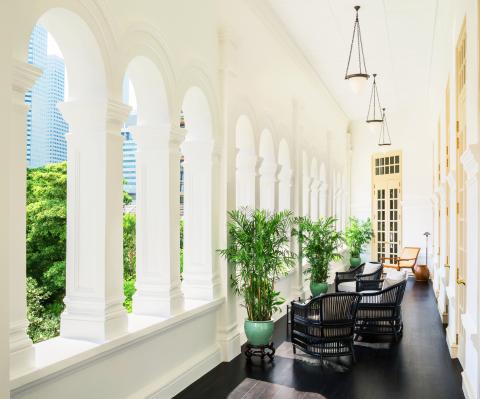
Photo courtesy of Raffles Singapore
Raffles, which hosted a grand reopening festival yesterday following an extensive renovation that brought the icon into the 21st century, has hosted everyone from Somerset Maugham and Rudyard Kipling, to Elizabeth Taylor and King Edward VIII (the monarch who abdicated the British throne to marry American divorcee Wallis Simpson). From humble beginnings in 1887, it now houses a variety of restaurants, bars and numerous upscale shops, in addition to its luxury suites.
HOUSE OF MEMORIES
“For me the very special grace of Raffles is that it offers such intimacy and such a sense of quiet and of privacy,” Pico Iyer, the American essayist and novelist who recently completed a stint as the hotel’s writer-in-residence, said via e-mail.
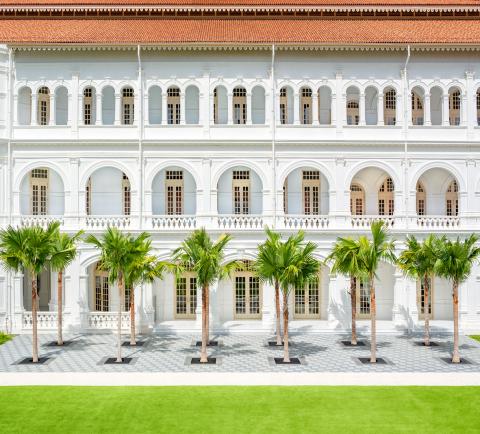
Photo courtesy of Raffles Singapore
“The verandas outside each room, the books placed inside each room, the green lawns near almost every room and the quiet spaces on the second and third floors overlooking the lobby all invite one to take a break, to read, or sip a drink, or make sketches, or write letters, or keep a diary.”
The best thing about working at Raffles?
“My colleagues are like family to me,” shares senior doorman Narajan Singh, who has been with the hotel for 28 years. Even though it’s situated in the center of a busy city, he says, “you will always be able to have a quiet moment to yourself, sitting at one of the benches around the hotel’s courtyard or gardens.”
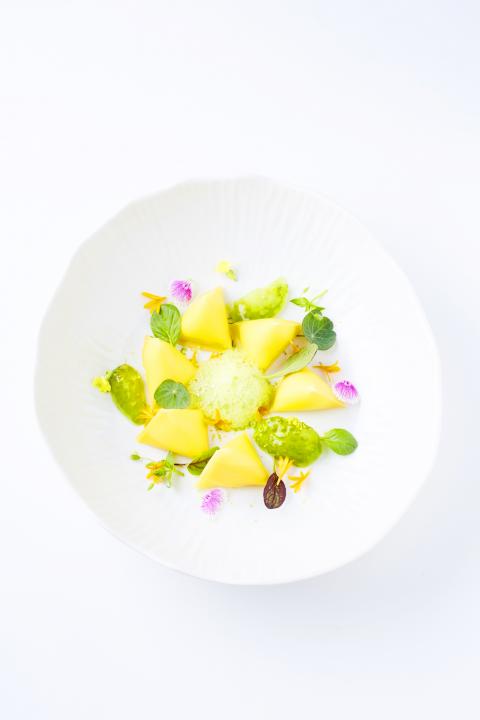
Photo courtesy of Raffles Singapore
The hotel often welcomes guests whose parents and even grandparents have previously stayed there.
“I can’t stress enough how special the Raffles Hotel is to people,” head butler Kiong says.
The ultimate emblem of the hotel’s place in history is the Singapore Sling. Bartender Ngiam Tong Boon created the cocktail here in 1915. Guests willing to brave the lines of tourists can enjoy one at the famous Long Bar. And if you’ve had a Singapore Sling elsewhere and didn’t like it, it’s still worth trying this one — it’s far better than most iterations. If you really love the fruity concoction, the hotel even offers a masterclass in how to make them.
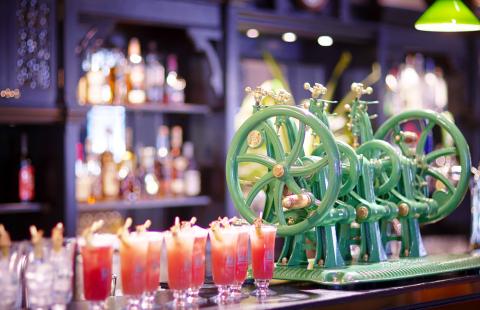
Photo courtesy of Raffles Singapore
OLD-WORLD DINING
For dining, one in-house option is La Dame de Pic, the Singapore outpost for Anne-Sophie Pic, a gifted and delightful French chef who has 10 restaurants and seven Michelin Stars under her belt. The tasting menus don’t disappoint. Pic’s signature berlingots — pasta with French cheese fondue filling — explode with flavor. The wagyu beef is spectacular, and the tomato and fish dishes are lovely on the eye as well as the tongue. The cheese cart is worth saving room for. Be prepared for a hefty price tag, especially if you opt for the wine pairing, but the menu is equal to the cost.
For a post-dinner tipple, the Writers Bar is a small but sophisticated place off the lobby, featuring a series of cocktails inspired by famous authors who have visited the hotel over the years. There’s even a drink based on the traditional Southeast Asian dish rojak, a spicy fruit and vegetable salad. The bartenders fall easily into conversation, but will also offer privacy when a patron wishes.
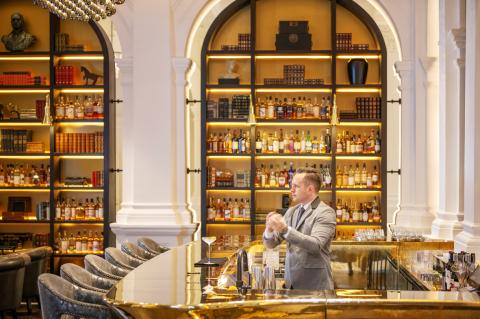
Photo courtesy of Raffles Singapore
Here in August, Iyer waxed poetic about his writer-in-residence gig — a stint that produced his book This Could Be Home: Raffles Hotel and the City of Tomorrow.
The “ultimate moment” at the hotel, Iyer said, “is the early evening, maybe 6 o’clock, you sit out on the veranda drinking a cup of tea or something stronger, you have a book there or a diary or a postcard, the wind is coming in off the sea taking the heat off the day.”
For yet another slice of history, be sure to visit the Bar & Billiard Room, which opened in 1896 as a club under British colonial rule. It’s the oldest standing bar in its original location in Singapore and is said to be the place where the last tiger was killed in Singapore, in 1902.
The space has just reopened as BBR by French-born chef Alain Ducasse, offering shared dishes that highlight Mediterranean cooking. Small plates like salted cod fritters and octopus with paprika and olive oil are served along with heftier dishes like roasted sea bass and barbecue striploin steak.
The Tiffin Room, which has been part of the hotel’s history since 1892, serves North Indian cuisine in tiffin boxes — containers with multiple compartments stacked on top of each other that are used for meals in India and beyond. Wooden floorboards have been brought back to revive features from the early 1900s.
Another dining option is Yi (藝, or “art”) by Singaporean chef Jereme Leung, which brings adaptations of provincial cuisine from across China. The wide-ranging menu features suckling pig and dim sum selections along with braised sea cucumber and abalone. There’s even a section for “Chef Leung’s favorite drinking snacks,” including Sichuan-spiced crispy fish skin and century eggs with roasted peppers and pickled ginger.
Outside, the Raffles Courtyard contains an open-air bar that sits in a beautifully landscaped area of the Raffles Arcade. A gazebo-like structure covers the main bar area and there are umbrellas over other tables. Guests are provided with paper fans to help cool off from the tropical heat.
And hidden away on the top floor is the pool, enticingly blue on hot days in the city. You’re in the heart of Singapore, overlooked by a handful of towers, but you might as well be a world away.
“My very first night of my 15 recent nights in the new Raffles, I was introduced to a little lounge in the spa in which one can recline in a quiet, dark room, sip tea and nibble at the nuts on offer and, quite wonderfully, do nothing at all,” the writer Iyer said by e-mail.
“One does not have to get a spa treatment or even use the Jacuzzi to enjoy this lounge if one is staying at Raffles, and every time I visited, it was completely empty and beautifully, liberatingly silent.”

In recent weeks the Trump Administration has been demanding that Taiwan transfer half of its chip manufacturing to the US. In an interview with NewsNation, US Secretary of Commerce Howard Lutnick said that the US would need 50 percent of domestic chip production to protect Taiwan. He stated, discussing Taiwan’s chip production: “My argument to them was, well, if you have 95 percent, how am I gonna get it to protect you? You’re going to put it on a plane? You’re going to put it on a boat?” The stench of the Trump Administration’s mafia-style notions of “protection” was strong
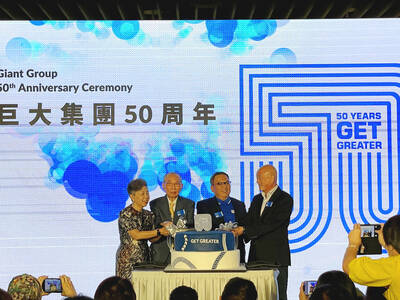
Late last month US authorities used allegations of forced labor at bicycle manufacturer Giant Group (巨大集團) to block imports from the firm. CNN reported: “Giant, the world’s largest bike manufacturer, on Thursday warned of delays to shipments to the United States after American customs officials announced a surprise ban on imports over unspecified forced labor accusations.” The order to stop shipments, from the US Customs and Border Protection (CBP), came as a surprise to Giant, company officials said. Giant spokesman Ken Li (李書耕) said that the CPB never visited the company’s factories to conduct on-site investigations, nor to interview or

Every now and then, it’s nice to just point somewhere on a map and head out with no plan. In Taiwan, where convenience reigns, food options are plentiful and people are generally friendly and helpful, this type of trip is that much easier to pull off. One day last November, a spur-of-the-moment day hike in the hills of Chiayi County turned into a surprisingly memorable experience that impressed on me once again how fortunate we all are to call this island home. The scenery I walked through that day — a mix of forest and farms reaching up into the clouds
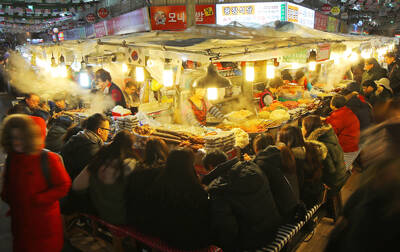
“Eighteen years ago, people didn’t even know the name of this ingredient,” says 58-year-old Gil Sa-hyeon, holding up a cluster of dried brownish stems. “Now it’s everywhere.” His shop, Joseon Yakcho, sits in the heart of Seoul’s Yangnyeongsi Market, South Korea’s largest traditional medicinal herb market, its streets lined with shops displaying buckets of herbs such as licorice root and cinnamon bark that spill on to the pavements, filling the air with their distinct, earthy aroma. The ingredient Gil is referring to is hovenia dulcis, known in Korean as heotgae — the oriental raisin tree that’s become the cornerstone of South Korea’s